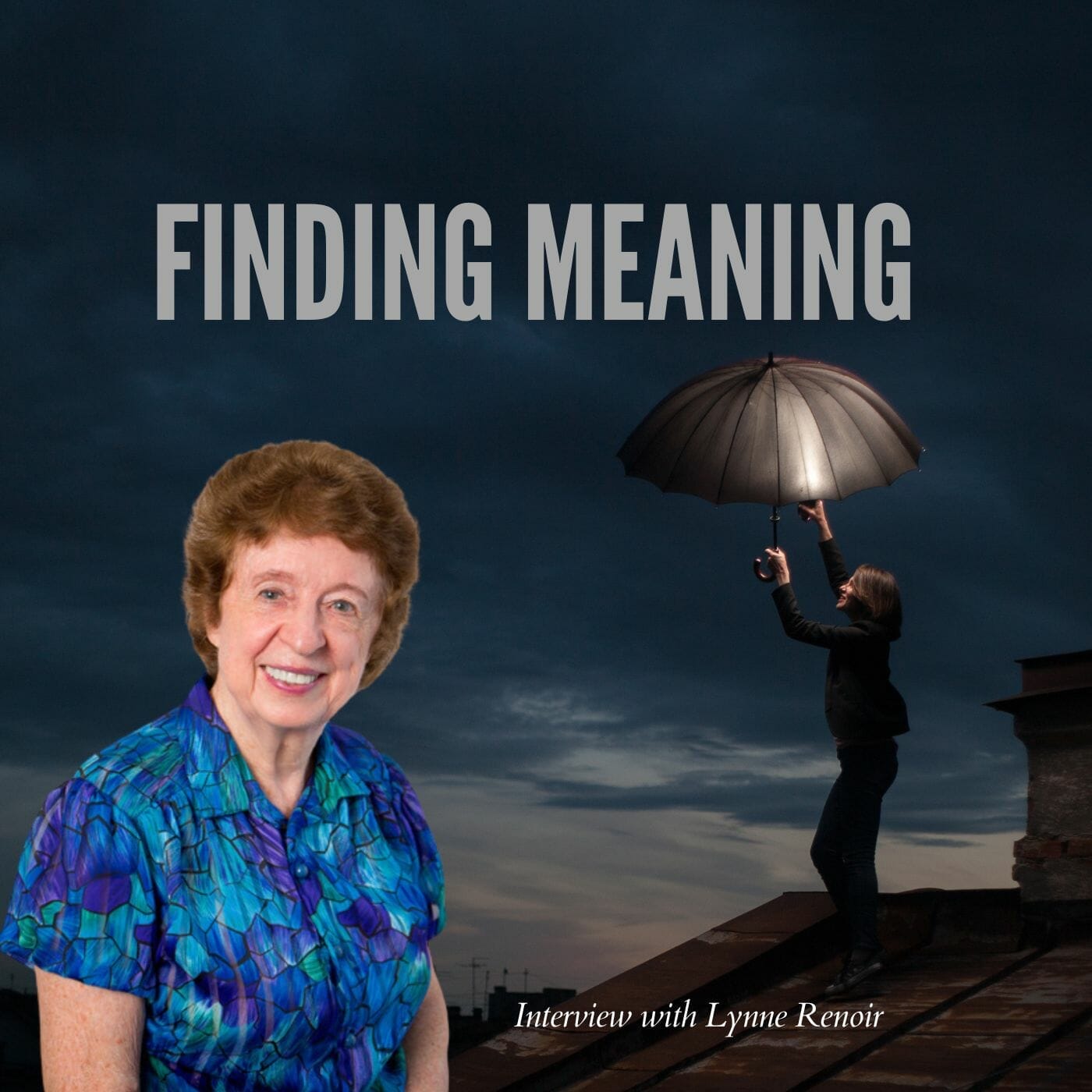Lynne Renoir: Finding Meaning

Lynne Renoir is a philosopher, researcher, and author of The Abuse of Men, an inquiry into the Adult Experience of Heterosexual Abuse, based on her research for her master’s thesis on this topic.
An Interview with Lynne Renoir: Finding Meaning
Interview by Sandie Sedgbeer
Domestic violence has increased dramatically over the past few decades. The figures rose even more sharply during the covid lockdown period. But when we hear the words spousal abuse, most of us assume that the victim is a woman when about two in five domestic violence victims are actually men. That’s right. Women aren’t always left battered and bruised by a violent partner.
Yet, the abuse of men by their female partners is rarely covered by the media or recognized as an issue in society. The abuse of anybody is just unforgivable. The abuse of women and animals is campaigned against in many societies. Still, the abuse of men by women happens far more frequently than we know, yet it remains largely a dirty secret. Why is that? Lynne Renoir joins me to shine some much-needed light on a vast social inequality that urgently needs to be acknowledged, discussed, and rectified.
To listen to the full interview of Lynne Renoir by Sandie Sedgbeer on the OMTimes Radio & TV show, What Is Going OM, click the player below.
SANDIE SEDGBEER: Lynne, your book, “The Abuse of Men,” makes a very uncomfortable and startling reading. Why did you choose this particular topic for your thesis?
LYNNE RENOIR: I became interested in this subject because of my work as a massage therapist. Many of my patients were men, and some began to tell me of the cruel way their partners treated them. So, I wondered whether this subject had been researched. Still, when I looked at the literature, I found that most of the studies addressed the abuse of women by men. So, I decided that my thesis would be on the abuse of men by women.
SANDIE SEDGBEER: You found that the abuse employed by the partners of men that you spoke to wasn’t just psychological. It was physical and even sexual too. Can you give some examples of the worst behaviors from your case history?
LYNNE RENOIR: With physical abuse, one man told me that his partner burnt a hole in his arm. Then she threw a cooking pot that smashed him in the face. Then she grabbed a knife and threatened to gouge out his eye. Another said that his partner would kick him in the genitals, then she’d scratch and bite him, and then threaten to kill herself if she didn’t get what she wanted. For many men, the psychological abuse was even worse than the physical. Their partners would constantly criticize how they spoke, worked, and even how they hung their clothes. One man said if he forgot to put out the rubbish, his partner wouldn’t speak to him for weeks. In the sexual area, some women would use sex as a system of reward and punishment. If the man did something they liked, they would turn it on sexually, and if he did something that displeased them, they would turn off sex completely.
SANDIE SEDGBEER: How did this kind of abuse affect these men?
LYNNE RENOIR: A lot of them closed down emotionally. They can’t even allow themselves to feel that they need love and tenderness. They’re not getting it and can’t ask for it because that would allow the woman to say no. One man said that he felt he was dying inside. He said, “It’s like cancer that eats away at you, and all you have is pain that never goes away.” Several of the men felt suicidal; there was no point in living. Their partners had destroyed any sense of self-respect they may once have had.
SANDIE SEDGBEER: What recourse do men have for support when abused by a partner?
LYNNE RENOIR: They have very few resources. For example, if they ring a rape crisis line, the person they would speak to will automatically assume that they are, in fact, the rapist.
SANDIE SEDGBEER: So where did you go to find men who were victims of spousal abuse?
LYNNE RENOIR: I first went to the State Library of New South Wales, where I found information about groups working for law reform.
Some of these groups are specifically designed to address the problem of men in abusive relationships. So I went to these groups, told them about my thesis, and invited any man who had been abused to contact me. Then I would contact him and conduct a telephone conversation, which I recorded.
SANDIE SEDGBEER: Did you find it difficult? Were the men eager to come forward because somebody would listen to them? Or were they ashamed and held back?
LYNNE RENOIR: They had a variety of responses. But once they knew the whole thing was confidential and I would never use their real names in the thesis, I think they felt more confident; that they could trust me with the information.
SANDIE SEDGBEER: It’s common in abusive relationships for abused people to feel it is their fault. And, of course, most of what we know is really about women. So, do these men think it was their fault that they were doing something wrong?
LYNNE RENOIR: Not at first. But gradually, as the behavior of the woman got worse, they started to think: “Well, maybe I’m doing something to trigger off this abuse from her.”
SANDIE SEDGBEER: You also explored the social structures that enable such abuse to occur. Tell us about that.
LYNNE RENOIR: Well, as far as the police are concerned, in cases of domestic violence, they will nearly always blame the man, even when they can see that he is the one who has sustained all the injuries. Then, the woman’s story is believed when it comes to the family court. In one case, a woman accused her partner of sexually interfering with their daughter; It was her attempt to try to prove that her partner was, in fact, the abuser. Still, the judge found in the end that the woman had abused the girl.
SANDIE SEDGBEER: Do you know whether children are put on the stand in cases like this?
LYNNE RENOIR: Well, young children will never be asked. Teenagers can sometimes be asked.
SANDIE SEDGBEER: And what would happen? For them to stand up for their Father as opposed to their mother must be really hard for them.
LYNNE RENOIR: The children are placed in an impossible situation. Whatever they do is wrong; they’re going to alienate their mothers; they’re going to alienate their fathers. So, it really is a terrible situation for children.
SANDIE SEDGBEER: You say that abused men are in a weaker position than abused women. Why?
LYNNE RENOIR: Because society has come to see men as the ones who are the cause of all the evil in society, if they claim to have been abused by a woman, they’re not believed.
SANDIE SEDGBEER: I recall reading one story of a man who was laughed at in court by the judge and the jury.
LYNNE RENOIR: Oh, yes. The courts take a very dim view when a man claims to have been abused by a woman; they think, “Well, that just can’t happen at all.”
SANDIE SEDGBEER: What is the lasting damage to these men?
LYNNE RENOIR: The effect on them is devastating. They lose the will to live; they feel that life is just futile.
SANDIE SEDGBEER: They must lose all faith in women and in themselves!
LYNNE RENOIR: Yes. They certainly are hesitant about going into other relationships with women.
SANDIE SEDGBEER: What lies behind such abusive behavior on the part of women?
LYNNE RENOIR: I think because women have come to see men as the oppressors in society, they feel that if they abuse a man, they’re getting back at all men. And they’re trying to right the injustice they feel has been done to them.
SANDIE SEDGBEER: Are there mental health issues involved here? On the part of the women?
LYNNE RENOIR: Yes. I wasn’t able to research the background of the women. Still, I think you can assume that when anybody engages in abusive behavior, that person has come from a family where abuse was quite common.
SANDIE SEDGBEER: Did your research look into the class of the people involved? Were working-class women more likely to abuse? Or was it middle class?
LYNNE RENOIR: I didn’t see any difference in class as far as the women were concerned. The men tended to be very well-educated and non-aggressive men. They hated the thought of ever abusing a woman.
SANDIE SEDGBEER: What is the origin of this bias against abused men as far as society is ‘concerned?
LYNNE RENOIR: A prejudice against men goes right through society. The media will never publish stories about men who claim to have been abused by women. The police find it very difficult to believe men, and the family courts nearly always give custody of children to the woman, even when there is strong evidence against them.
SANDIE SEDGBEER: We know that female abuse occurs in many countries and has done so since the beginning of time. We don’t know much about the abuse of men, but the abuse of anybody is completely untenable. You wrote that even people who are sympathetic to the plight of men today find it difficult to rid themselves of the idea that men have all the power. Why is it so hard for society to accept that men can also be victims of domestic abuse?
LYNNE RENOIR: Society has come to absorb the feminist agenda that men are the perpetrators of all the evils in the world. So, because of this, it’s hard for people to understand that these so-called perpetrators could themselves be the victims of abuse.
SANDIE SEDGBEER: At the time of your research, which was about ten years ago, you noticed a huge lack of support options for men. Is that still the case?
LYNNE RENOIR: I think it’s getting a bit better, but there’s still a long way to go.
SANDIE SEDGBEER: What impact did research on this subject have on your thoughts of men and women in general?
LYNNE RENOIR: I was devastated to think women could behave like this. I always imagined that women are on a pedestal. We’re supposed to be the good ones in society, and men are supposed to be the bad ones. But my research showed me that it’s not at all the case. Women can be bad, and men can be bad, but society only looks at the bad that men do. Society does not look at the evil that women can do.
SANDIE SEDGBEER: You write in your book about a “feminist agenda.” Do you think that feminism, over the last 50 and 60 years, has skewed things in a way that really does not support men?
LYNNE RENOIR: I think the rise of feminism was necessary because of the abuse that is done to women. But the flip side is that men have come to be seen as evil.
SANDIE SEDGBEER: So, what do you think we need to do?
LYNNE RENOIR: I think the media needs to be more open to men’s stories. I think the police need to be more willing to believe what men are saying. And as far as the family court is concerned, they need to understand how easily women can misrepresent the situation with their partners. And because of this, I think the family court needs to be more even-handed in how it awards the custody of children.
SANDIE SEDGBEER: And in order for things to change, the media need to be fairer in the coverage?
LYNNE RENOIR: Yes. The media is terribly biased. When was the last time you read a story about a man abused by a woman? I mean, it just doesn’t happen.
SANDIE SEDGBEER: Well, we recently had the Johnny Depp case. He said that his wife, Amber Heard was very abusive to him. And she was saying exactly the same. But interestingly, more people felt sorry for him than for her.
LYNNE RENOIR: Yes. That was interesting and a bit unusual, I would think.
SANDIE SEDGBEER: Tell me about the children. Were men ever able to get custody of their children because of spousal abuse?
LYNNE RENOIR: it’s very difficult for men ever to get custody of their children, even when the court knows that the woman has been abusive, not only to the man but sometimes to the children.
SANDIE SEDGBEER: You have your own story of abuse, chronicled in your memoir, Leaving Faith, Finding Meaning – A Preacher’s Daughter’s Search for God. Did your experience as an abused daughter influence your thought processes when you were conducting your research?
LYNNE RENOIR: Well, it triggered off very painful family memories. It was very difficult growing up in a family where my Father believed he was God’s representative of the family. He believed the words of Solomon to use the rod to discipline his child. And he did so frequently, even for the most trivial things – like forgetting to say goodnight, losing something, or even having an accident.
SANDIE SEDGBEER: Did that leave you with negative feelings about men, which you had to reconsider when you heard that men get abused too?
LYNNE RENOIR: Oh, it was a very confusing picture. I don’t think I wrote off men as a whole. I tried to put my Father in one particular box; hopefully, other men would not be in that box.
SANDIE SEDGBEER: Your Father was a fundamentalist evangelist who believed that every word in the Bible had been dictated by God. You believed that Christianity was true and that your heavenly Father loved you. And yet your Father, who put himself forward as God’s emissary on the planet, didn’t demonstrate love in his behavior. That must have been quite confusing for you.
LYNNE RENOIR: Yes, I was torn between believing that as the head of the house or the family, my Father had the right to discipline me in any way he chose. But I could not understand why these punishments had to be so harsh.
SANDIE SEDGBEER: How did he punish you?
LYNNE RENOIR: He started by smashing his hands across my face if I did something wrong. Then he read in the Bible that he is supposed to use the rod. So, one day, he went out into the bush, broke off a branch, and made a cane. And he used that cane to beat me.
SANDIE SEDGBEER: You have three sisters, yet you got beaten far more than they did. Why was that?
LYNNE RENOIR: My parents believe the Bible – that a woman has to be quiet, gentle, and submissive. I was nothing like it, but my sisters were more like my mother. She was quite gentle and submissive.
SANDIE SEDGBEER: How long did the abuse go on?
LYNNE RENOIR: It went through my teenage years and into my twenties until I eventually had the courage to leave home at 23. I had my last beating when I was 23.
SANDIE SEDGBEER: What tipped you over the edge there? What was” “the straw that broke the camel’s back”?”
LYNNE RENOIR: I thought if I didn’t leave home, my Father would think he had the right to beat me with this rod until he died. And I thought, I’m not going through my 20s, 30s, and 40s being beaten with this same rod.
SANDIE SEDGBEER: Did you not think that you were actually rebelling against God by leaving?
LYNNE RENOIR: Oh, that was a hard one because part of me believed what my parents believed: that I was supposed to be gentle, quiet, and submissive. But then I began to meet people with no religious beliefs, and they seemed to have the qualities I was supposed to have. So that made me wonder whether perhaps my beliefs were wrong.
SANDIE SEDGBEER: Your parents were very controlling. They wouldn’t allow you to follow a new path even though you were an adult. How did that affect you?
LYNNE RENOIR: It made me very angry and sad. I was an adult. When I was 16, I wanted to stay at school to become a teacher. But they said no; if I became a teacher, I would become even more what they called “aggressive.” It was all right to be aggressive if you were a man. My Father was full of aggression, but a woman had to be quiet and gentle and say yes, and I was not.
SANDIE SEDGBEER: Did you feel there was something spiritually wrong with you because you weren’t this docile female your Father thought the Bible said you should be?
LYNNE RENOIR: For many years, I thought I was a failure as a believer. I thought” ” I can’t exhibit all these wonderful qualities I’m supposed to have, so what does God think of m”?” So, it was a very difficult period. This went on for quite a few decades.
Click HERE to continue to Page 2 of the Interview with Lynne Renoir
Click HERE to Connect with your Daily Horoscope on OMTimes!
Visit Our Astrology Store for Personalized Reports
OMTimes is the premier Spiritually Conscious Magazine. Follow Us On Facebook, Twitter, Instagram, Linkedin, Pinterest, and Youtube
A veteran broadcaster, author, and media consultant, Sandie Sedgbeer brings her incisive interviewing style to a brand new series of radio programs, What Is Going OM on OMTimes Radio, showcasing the world’s leading thinkers, scientists, authors, educators and parenting experts whose ideas are at the cutting edge. A professional journalist who cut her teeth in the ultra-competitive world of British newspapers and magazines, Sandie has interviewed a wide range of personalities from authors, scientists, celebrities, spiritual teachers, and politicians.







